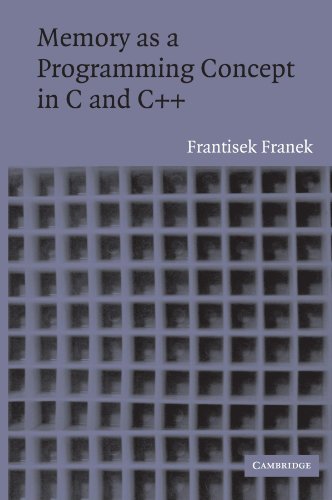

Memory as a Programming Concept in C and C++ Frantisek Franek
Publisher: Cambridge University Press
Frantisek Franek, «Memory as a Programming Concept in C and C++» Publisher: Cambridge University Press | November 2003 | ISBN: 052181720X | Pages:272 | Format: CHM | Size: 3 MB. (B) permit data to be hidden from other classes. I'm quantifying language complexity by comparing the number of concepts a programmer has to understand to learn a programming language - C++, Ruby or CoffeeScript - in its entirety. (C) bring together all aspects of an entity in one place. With C++11, it has become easier to start with the modern high level subset of C++ (and the standard libraries), and then gradually add on the intricacies and the low level features. A property which is not true for classes is that they (A) are removed from memory when not in use. Widely used for both systems and applications development, the C and C++ programming languages are available for virtually every operating system and are often the best choice for performance-critical applications. Programming questions are main part of any programming job interview. This hash table is written using Mintomic, a portable library for lock-free programming in C/C++ which I released last month. It compiles & runs on several x86/64, PowerPC and ARM-based platforms straight out of the box. This article contains some of the best programming questions asked during interviews. Introduction This article is a continuation of the C/C++ Visual Studio Express debugger series. However, one of the things written there is actually true – we do have plans to create an IntelliJ-based C++ IDE at some point. This is different from the stack, as stack allocations are based on a first -in-last-out concept, such that when returning from a function data can be lost unless explicitly posted to a common “return” point. So practice these cpp objective questions on oop concepts and improve your object oriented programming skills. Part 1 provided a quick start guide in using the debugger. Every c++ programmer should have grip over the object oriented programming concepts in c++. (D) Can closely model objects in the real world. Now it has to be said that "with great power comes great responsibility" and if you use Unsafe it is effectively the same as programming in C, and with that can come memory access violations when you get offsets wrong. Dynamic memory allocation is a common feature of programming languages (or libraries, such as in C/C++[3]) that allow allocation of varying sized pieces of data at run-time.